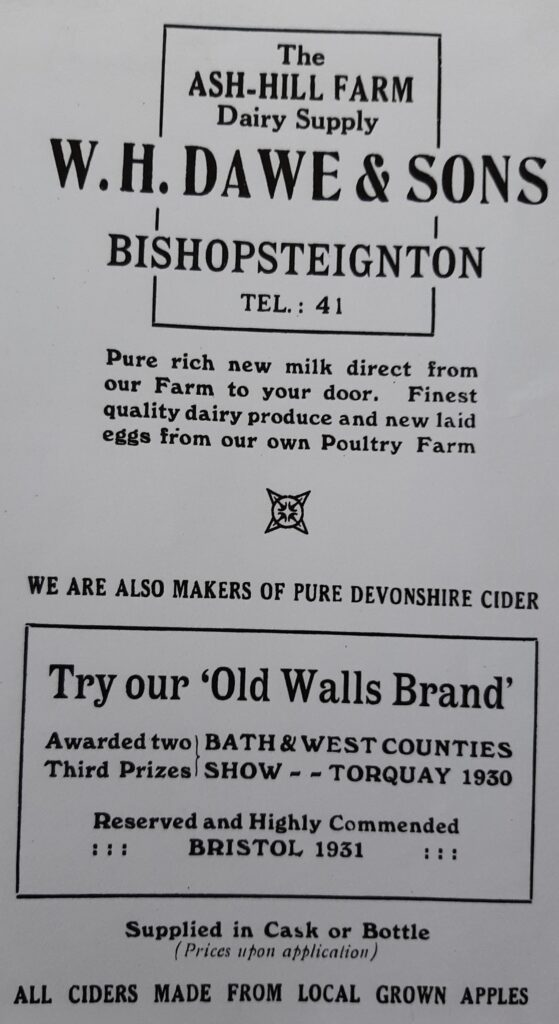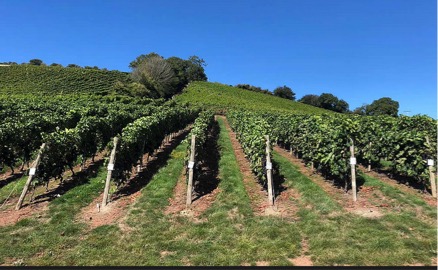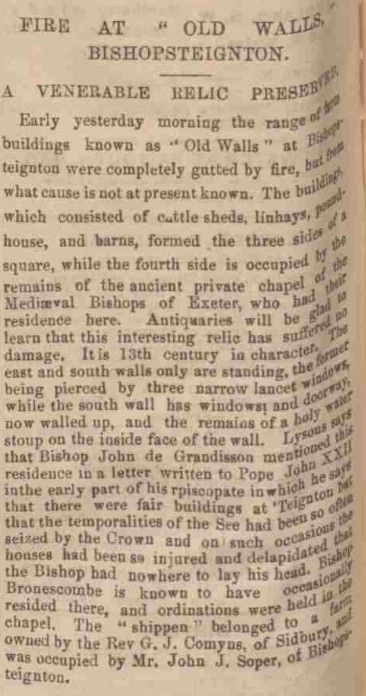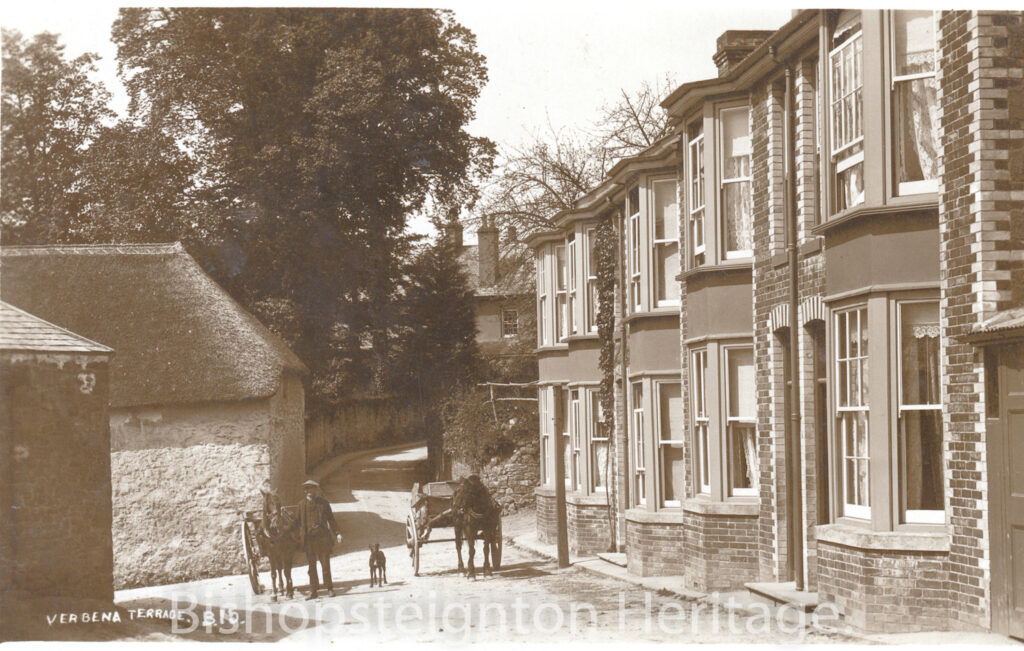Ken Dawe
Cider. Grandfather was always into his cider. When he came here, of course he only had the first farm – the 240 acres – and there were quite a few acres of orchards so he started making cider like they all did in those days. Now, his first press was the Whidbourne’s old cider press, you know that post you’ve got in the corner? It was up the top end of the yard and it was a bit strange really because it was against the wall and they had a gutter where they used to collect the cider from the apples. I don’t know where it went to start with but Grandfather piped it on down but in the early years when he was here, he still used this cider press. They had the big concrete square at the bottom and they would start by putting straw down.
There must have been a machine that smacked the apples up into pulp and that came down a shute and they would build up what they called “cheeses”. They had a layer of pulp and then they put on some more straw, another layer of pulp, straw, pulp, straw and they would keep the sides trimmed down and then the big top, which isn’t there now, but the thread which ran up the middle – normally you would have got a horse or something to walk round and round to screw this down but of course they were against a wall, so they had a thing which had a ratchet and they probably did it by hand because you couldn’t get horses in there and they would ratchet this thing down, and old Frank used to say after the day, that he would have to come up in the evening and squeeze it down a bit more and of course, the straw acted like a filter to keep the pulp back and the cider ran out.
Well, Grandfather had started to develop a big cider industry and he ran the cider down proper pipes all the way down to …. You’ve been over the road, haven’t you, to Roger’s farm, and you look up and there are some white brick buildings. Well, Grandfather put that up for his cider business, and he had hundreds and hundreds of casks of different sizes and the cider used to run down and they would fill a big concrete tank he had built and he had one of these hand pumps in the day and he was sat on his chair, pumping this thing, puffing away on his pipe, and they would pump the cider into the casks and put it fermenting and away he went.
But, of course, that was a bit of a pain doing that so he had the most elaborate, of its day, cider press installed right up the end and it was one of the best you could buy because, by then, they had bought the other two farms and they had probably 30, maybe 40 acres of orchards, but not only that, he used to buy in apples from other farms and they used to make hundreds of thousands of gallons and they had this press; they used to bring the apples up in carts and trailers and whatever, tip them in the big double doors and then they had to shovel all of them into the hopper of this elevator that took them up to what they used to call “the mill” which milled the apples up into pulp. That went down to another shute which had a sliding door. Again, the same thing, they would pull it out, but instead of using straw they had big slats. You can still get them now, for people who make cider, probably this big, criss cross slats of wood and hessian which took the place of the straw so they would put a slat down, hessian, they would let down a load of pulp, fold the hessian over, put another rack on and build it up like that, and then the press was hydraulic, but not oil hydraulic, it was water hydraulic, and they had this big paraffin, petrol engine which used to provide all the motive power to work the press and press it all down. The cider then used to run down into these two tanks – the same two tanks that he had had before
Yvonne: So where did he sell it? Did they bottle it?
Ken Dawe: Oh, all the pubs in the village, Newton Abbot, Teignmouth
Yvonne; It was still out of barrels then, was it?
Ken Dawe: Yes. I remember going with my Dad. Obviously, barrels come in different sizes and they had a ramp and they used to roll them. Once they had fermented and the froth had come out, they would bung them down. They had a bung with a bit of sacking around, hammer them down – they had a cork or something in where the pubs would have their tap – and he would roll them up into the van and do his round to the various pubs.
Yvonne: Was it called Dawe’s?
Ken Dawe: Yes. I’ve got somewhere a stack of labels but they are all stuck together! You know that book of the village?
Yvonne: What, the Cleland?
Ken Dawe: Yes, that book, is it near the back, there’s an advert for Old Walls brand cider

Old Walls Cider advertisement
Yvonne: I’ve got it in my bag, that book because I’m going to take one for Glyn tomorrow.
Ken Dawe: In the back, back page is it, or somewhere near there?
Yvonne: Yes, there it is. Ashill Farm dairy supply, [??] Old Walls Brand, Bath & West Counties. Supplied in cask or bottle. All ciders from local grower
Ken Dawe: They also used to do what they called filtered cider which had obviously been filtered and it was the best you could get. They used to have to buy in casks from time to time, of course, because they didn’t last forever and they would buy in casks that had had brandy and port and all that in them and when the cider was in them it used to draw the flavour of whatever had been in there before – the port and the cider used to really sell well.
Yvonne: Is that how the vineyard idea started?
Ken Dawe: Yes, that’s why we called it Old Walls Vineyard. But they also installed, and again it’s on the video, two massive – built like barrels – tanks. I think they held about 1500 gallon each which is quite a lot, and they installed them where Roger has now got his grain drier, which my Dad and I more or less constructed between us, and they used to store bulk cider and then have to pump it (indistinct few words), so that was big business.
Yvonne: I had no idea
Ken Dawe: Old Frank used to say Grandfather collared him not only at apple harvest time but about a month before, he had to stop farm outside work and they had to get everything ready for the forthcoming cider harvest. All the barrels had to be cleaned, they had to be burned out with sulphur candles to kill any bacteria, get everything ready. He said that took nigh on a month, and then there was the apple harvest which lasted another month and then of course they had all the clearing up after it fermented and pumping it here, there and everywhere. He was probably one of the biggest farm cider producers in the area.
Yvonne: There were quite a lot of orchards around the village, weren’t there, because all round the Cockhaven were orchards weren’t there?
Ken Dawe: Oh yes. Down here. Have you heard of Buswell’s farm, where there used to be – what’s the next development down, Radway? There used to be a farm there, a market garden type farm run by a family called Buswell and they had land up where all our higher vines are planted and Bill Honeywill, he used to be a horse driver there and he had all the fancy gear when it was time to tart them up for carnivals and the like.
Yvonne: Yes, I’ve got pictures of that and Gunner Sharland did as well, didn’t he?
Ken Dawe: That all went on because horses were the thing, and I always remember old Frank saying to me “Grandfather said to me “We’ve got to change over to tractors because horses are getting towards a thing of the past”. He said, “I’m going to give you a choice. You can either leave if you wish and go and find another farm that is still running horses, or you can be just an ordinary general farm worker”, which he decided to do. I can still remember one horse there when I was a youngster but the rest obviously went and then all the tractors came in, but old Frank didn’t want to get involved in tractors; he was a horse man, you know. What he couldn’t do with a horse. You imagine, some of the fields are not all that big and trying to turn a couple horses pulling a plough and other equipment.
Yvonne: They still have some of that equipment up at the ploughing when they do the thing up at the farm, don’t they?
Ken Dawe: That isn’t this year, is it? Because it’s alternate with the …
Yvonne: I don’t think they are doing the vintage rally this year
Ken Dawe: Because they used to do the one down on the village green
Yvonne: And then next year they would have the vintage rally up the top and they had the ploughing in the field down the way, didn’t they?
Ken Dawe: One of the old tractors that I bought off my cousin for the engine and gearbox when we first started here, my – call him my son in law but he isn’t really, he is my daughter’s partner – is into tractor restoration. I bought it off Roger for two hundred quid for parts because it had been stood idle in the brimbles. A lot of people don’t understand when I say brimbles
Yvonne: What’s the brimbles?
Ken Dawe: Brambles! I bought it for parts but he bought it off of me and he’s restoring it and I was hoping that if they had another ploughing do-da in there I would find myself a plough because I used to enjoy my ploughing. I used to plough nearly all the arable land here until Roger took it over from me and that’s something else which made me quite cross. I really enjoyed my ploughing and I would go back and do it tomorrow. No, I wouldn’t, it’s too wet, but you know what I mean.
Yvonne: So how did it end up being a vineyard then?
Ken Dawe: Ah, well, back in the late eighties – nineties, rather – I pulled out of the farm but because I was a partner along with Roger and his father and my father, I had to have my quarter share out so it was worked out. I wanted a bit of land because I had horses still, so we had the six acres the bulk of the vineyard is on now, we had the farmhouse where Rhoda is because I was already living there, we had the redundant farm buildings though we couldn’t occupy them for a year because Roger was still using them for stock and we had to put new buildings up to replace them, but that was fine, and we had a cash adjustment. Oh, we had a property down Radway Street which eventually we moved on. All these places we have moved on and I wish we hadn’t now.
To be honest I didn’t do a lot for twelve months but then we had to get our act together and there was an architect in Teignmouth became a friend of ours called Chapple who actually put the idea in our head to start a vineyard, because we were then trying to get permission for the winery and he said “if you’ve got an established business they are going to look a bit more favourably on it”, so when the horses had gone we gradually over three or four years planted all the vines from 2002, 3, 4 and 5.
Yvonne: So, was the cider business still going then?
Ken Dawe: No, that finished early to mid-sixties because we didn’t make our own by then. We used to sell the apples over the river to the cider makers over there, because after the war apparently, the drinking changed from cider to beer and the trade began to drop off, so we just ended up selling the apples and when we couldn’t sell them any longer we ripped the trees out, to be honest.
Yvonne: So, was there any history of there being vines here?
Ken Dawe: No.
Yvonne: Way, way back
Ken Dawe:Well, they reckon the Romans might have had, because they were here.
Yvonne: It’s the right sort of land for it, isn’t it? South facing.
Ken Dawe: A lot of people like old Phil Gourd and the like, he said “Oh, yes, you can see where the vineyards have been. There is all this terracing”. It wasn’t, it was where cattle had been walking to and fro. All these fields have got tracks where the cattle would walk constantly and of course, it got like this, but apart from what the Romans might or might not have done…

Old Walls Vineyard
Yvonne: It’s quite a brave move then really.
Ken Dawe: Well, I had to do something I suppose, and growing was as near as I could get to that. Of course, in the early days all the tools were hand tools – scythes, sickles, pitch forks, thatching tools, and grain of course was in sacks. There was no thought of bulk sacks. Now, you know about the barn fires we had over the way, do you?
Yvonne: No, I don’t
Ken Dawe: Right. First fire we had – I don’t know when this would have been – early ‘70s. That’s right because my Dad had had his stroke and his heart attack so he wasn’t active. We were over in the house – that’s with my first wife, over where Rhoda is. We had gone bed and then somebody comes hammering on the door. I don’t know what it was, 11 or 12 o’clock at night I suppose. So, I poked my head out the window. I said, “Whatever’s the matter?” He said, “Did you know your barns were on fire?”. I obviously said “No”. I thought he meant out here, but it wasn’t, it was over there, so I got dressed hurriedly and went over – drove over, I think – and as soon as I rounded that bend over there, I have never seen anything like it. It was just one mass of good fire glow.
How it started was this. It was in March time, I think. We were up in the fields over the weekend drilling and planting corn and obviously came back at the end of the day. Unbeknown to us, there was a trip from out over Dartmoor – sort of a borstal-y type place – I think I could actually take you to where it is. They had a day trip, these youngsters, to Teignmouth. Now one of them lived in the village or was fostered to people in the village before he got put in this place so he and his mate skived off from the thing and they came here.
Well, as things were over there then, we had the big Dutch barn, the silage pit in which there was hay and straw on the top of the silage up to the eaves and then following on from there down to the road edge was what we called the straw barn, full of thousands of bales of straw and they had gone in there, and the stupid people had lit a fire in a tin box. Well! You can imagine what happened. It set fire to everything. One of them ran out. I don’t know whether they tried to put it out or not, I don’t know, but one of them got a bit singed. He ran out, ran down the village to the main road, got picked up by a passing car who was a bit suspicious why he was burnt and took him to Newton Abbot Police Station. In the meanwhile, his mate was trapped in there, and he was burnt to death. So, the fire brigade were obviously here in force at that point but they decided then just to let it burn itself out. You would never put it out.
Yvonne: Did they know there was somebody in there?
Ken Dawe: They didn’t at the time but then the word came back from Newton Abbot Police Station that there was the possibility of somebody in there so then they had to treat that with a bit more caution, and they found what was left of him. I don’t want to go into too detailed, but we were there because we had to pull tractors out the way.
Yvonne: How long ago was this?
Ken Dawe: Oh crikey, early seventies, and then I had left the farm. It was all wooden buildings so they just went, you know, and then Roger had another fire over there. Now this must have been early nineties. He had another fire in exactly the same place. Never established how that started but of course it burnt everything again. The barn we replaced the first time burnt down, the combine went, the tractors went. Everything went, so it was all rebuilt again, but I think that was possibly an electrical fault in a tractor or something because nobody was ever found.
So that was two, and that followed of course the fire in eighteen something over at Old Walls when the old barns which were predominantly thatched in those days burnt down. It’s in the paper somewhere. Have you seen it? Apparently, they all burnt down and they were rebuilt and that was some of the first galvanised iron that was used for the roofing and it was so thick. A lot of it is still there now and you can still see some of the perimeter walls which were backs of the farm buildings, timber that they used to lay in to put the floor joists on, you can see where it was burnt. It’s still there now. I can’t remember the date – eighteen something or other.
Yvonne: I’ll have a look at that in the newspaper archive.
Ken Dawe: There’s words to the effect that there’s a report in the Western Morning News that the barns at Old Walls had burnt down. [1]

Fire at Old Walls from the Western Times, Wednesday August 5, 1896.
Newspaper image © The British Library Board. All rights reserved. With thanks to The British Newspaper Archive (www.britishnewspaperarchive.co.uk).
Yvonne: I’ve been reading some of Philip Gourd’s stuff and he is talking about when they used to go out with beaters and they used to deliver the food and the drink to the guys on the shoots and him and his mate got accosted by some bloke who wanted something to eat and it turned out to be an escaped prisoner from Dartmoor. He had got the date wrong but everything else was in the newspaper report.
Ken Dawe: I haven’t heard of that. That’s about it. I could go on for ever
Yvonne: If you could find the DVD. I would love to …
Ken Dawe: It’s there. I’ll find it. In fact, I might have got two copies. I’m not sure
Yvonne: We can digitise it with your permission and you can have it back
Ken Dawe: There is people in the village who have seen it and there may be one or two illegal copies kicking about, I don’t know!
Yvonne: It was Sheila who told me about it and she said she had a copy.
Ken Dawe: It’s farm work mixed up with weddings. They used to use the old bowling green which was down the back of the garage. They always used to go up there to have their wedding photos. Obviously, I’m a Bishop boy because I’ve been here all my life but I never used to spend … All my cousins and friends used to come up here to play on the farm. You know we never really went down there much
Yvonne: Sheila’s Dad grew up just down the road, didn’t he? At Lower Radway Farm, just down the hill. Sid Skinner. No, I’ve got it wrong. It’s Philip Gourd’s father.
Ken Dawe: Yes, Gourd obviously started off with buses and lorries for removing furniture. They built the house down the bottom of Radway Hill
Yvonne: That one with the Italian garden?
Ken Dawe: No, further down than that. Go past the school canteen or the Scout hut, down the bottom you’ve got the lane where Jo Head lives. Right opposite that you’ve got two terraced houses and then the next one up has got like a garage-y thing to it. That was built for old Mr. Gourd and his wife, but where they lived while they were building the business, I don’t know.
Yvonne: There used to be a pub, didn’t there? And there was a fire and the firemen had to go down and get the horse and get some water and the whole row was alight by the time they got back.
Ken Dawe: Top of Radway Hill, wasn’t it? There was a pub there.
Yvonne: Is that what was Verbena Terrace, the little brick-built ones

Verbena Terrace Bishopsteignton
Ken Dawe: I suppose, but you’ve got me thinking. I believe Gourds had a fire as well, where they used to keep their buses.[2]
Yvonne: Philip wrote his life, at least up until the end of the War. It’s on the website. I’m just editing it at the moment.
Ken Dawe: He used to do a lot. He came up to the farmhouse and talked to Tangent ladies about things, because he used to do a lot of talks and guided tours up at Lord Clifford’s place – Ugbrooke.
